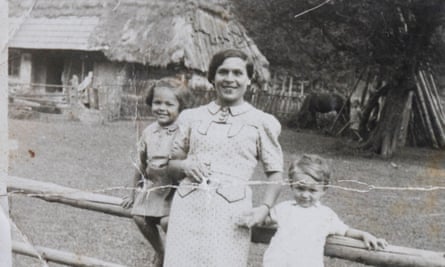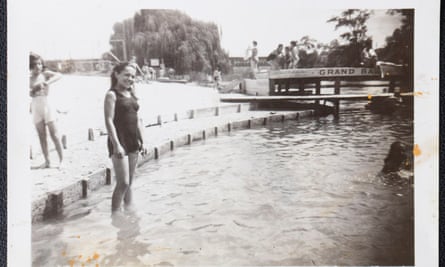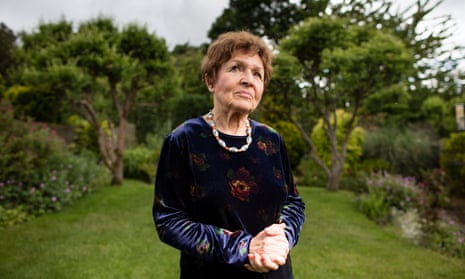When she was nine Janine Webber lived in a hole in the ground. She was there for a year. There was little room to move, no fresh air or daylight and nothing to eat apart from crusts of bread and raw onions. By then she had already lost to the Holocaust her father, mother, brother and grandmother.
Against all odds the little Jewish girl survived. Now, at almost 84, she knows the days are numbered. The living memory of Europe’s darkest days is fading as Jews who escaped the Nazis and emerged from the death camps pass away.
But an innovative project, to be launched on Sunday by the UK National Holocaust Centre and Museum, means Webber will continue to recount the story of her extraordinary life, answering questions from schoolchildren and other visitors.
The Forever Project uses advanced digital technology to project life-size 3D laser images of Holocaust survivors, and software which instantly matches audience questions with up to 1,500 pre-recorded answers. The result will be seamless interactive “conversations” with people no longer alive.
“A lot of survivors’ testimony has been captured on film, but what is not captured is their responses to children’s questions,” said Sarah Coward, of the National Holocaust Centre and Museum, which is in Laxton, Nottinghamshire. “Children ask fearless questions that adults often shy away from. For example, do you ever wish you weren’t born Jewish? That important interaction is in danger of being lost.”

About 20,000 schoolchildren pass through the UK centre each year, and most take part in a question-and-answer session with one of a group of 40 volunteer survivors.
“It’s hard for children to connect with a number as big as 6 million, but they do connect with individual stories,” said Coward. “Survivors have a profound impact on young people – how they think of others, how communities treat people, how they understand history.”
Based on 20 years of survivors’ responses to children, the centre compiled 1,500 questions. It asked 10 survivors in their 80s and 90s, who were volunteering at the centre, to be filmed giving their answers. The process took five days for each person, filming in 40-minute sections.
“It was emotionally a little tiring,” said Webber. “But it’s wonderful, and just incredible, if I can carry on telling my story from beyond the grave. I want people to know what happened to me and to my family. All survivors want to keep the memory alive.”
For 50 years Webber could not speak of her experiences during the Holocaust. Then one of her sons persuaded her to be interviewed by Steven Spielberg’s Shoah Foundation, and she has been talking to groups of schoolchildren for the past 10 years.
Among the questions she has been asked are: Have you forgiven them? Have you still got faith? What was it like to live in a hole? Are you Jewish? “Very occasionally someone asks me something new and unusual, but most questions I’ve answered many times,” she said.
The question about forgiveness has no simple answer. Instead it prompts more questions. “It’s very difficult. For many years I wasn’t sure, but now I’m sure that I haven’t forgiven. Who would I forgive? In whose name would I forgive? What is forgiving? Does forgiving mean forgetting?”
Webber was born in 1932, in Lwow, east Poland, a city with a large and thriving Jewish population. In 1941 Nazi troops occupied the city and began rounding up Jewish residents. Several times Webber’s family moved. During one raid her father and grandmother were discovered. Her father was shot; her grandmother was taken away screaming.

Eventually Webber, her mother and younger brother were forced into the ghetto, where her mother died of typhus. An uncle paid a Catholic family to take in the two children, but they were betrayed to the Nazis. Her brother was killed. Webber was told to start moving, and not look back. “I walked, I was walking for hours. I asked a woman for piece of bread,” she recalled.
The woman took in the child, but rejected her when she discovered she was Jewish. Webber threw herself on the mercy of a young man whose name she had been given by a relative months earlier. He led her to a building and told her to climb a ladder to a loft. There she found 13 Jews, including an aunt, hiding.
The group moved from the loft to a hole dug beneath the floor of a stable. “There was an electric bulb and a bucket. It was very hot, I remember wearing just my pants. There was very little food, just bread and onions. I stayed in that hole for nearly a year. I never left: no fresh air, no daylight.”
After they fled the hole the group split up, and Webber – barely able to walk after so long in a cramped space – went to a Catholic convent where she mimed the words to prayers to avoid being exposed as a Jew. “One day an elderly couple arrived, wanting a girl to help them. At eleven and a half, I became a maid. Of course they didn’t know I was Jewish.”
Six months after the war ended, Webber’s aunt found her and took her to Paris. Aged 24 she went to the UK, and then married and had children.
Although she has no original identity papers, miraculously she still has a few pictures of her family which she shows to the children as she tells her story. “Yesterday a child asked me if I still have flashbacks. I do occasionally, but the nightmares are not so bad. I think it helped [to speak about it]. I can now speak without crying all the time.”
Sometimes the children cry too, she said. “Their response is incredible. Quite often they want to hug me. At one school there were 70 or 80 queuing to hug me.”
The Forever Project will be launched at an interfaith service at Westminster Abbey on Sunday with a short film, which will be shown in cinemas this summer.
The recording of the 10 survivors was completed at a cost of £1.2m, but the National Holocaust Centre and Museum needs to raise an additional £800,000 to film another 10 people. It has been shortlisted for a 2016 National Lottery Award for Best Heritage Project. The winner will be chosen by public vote between 22 June and 30 July.
